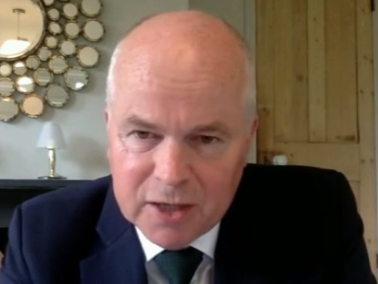
A former head of BBC Westminster and director of communications for Theresa May in Number 10 has claimed Newsnight has “totally distorted” its editorial agenda because of social media.
Sir Robbie Gibb, who was deputy editor on the BBC Two programme between 2002 and 2008, branded Emily Maitlis’ monologue about Dominic Cummings’ breach of lockdown rules a “massive mistake”.
BBC director of news Fran Unsworth said last week the monologue, which received 23,674 complaints, belonged “more on the op-ed page in a newspaper” than as the introduction to “an impartial broadcast programme” as she defended a ruling it had breached impartiality guidelines.
Giving evidence to the House of Lords Communications Committee’s future of journalism inquiry on Tuesday, Sir Robbie described Maitlis as a “very good friend” but said Newsnight had fallen victim to the way Twitter “terribly distorts the way supposedly impartial journalists operate”.
He said: “It was a massive mistake and it was driven, from my understanding, by the programme’s desire for impact on social media, for retweets, and that has totally distorted its editorial and its impartiality agenda on air.
“And it’s one of those occasions where I thought the BBC managers were absolutely right and needed to be applauded for responding so firmly and so quickly.”
Sir Robbie echoed comments from former Financial Times editor Lionel Barber and Dow Jones chief executive Will Lewis that journalists should stop their “unbecoming” use of social media to comment on stories.
He told peers: “What is the problem with Twitter? Firstly Britain isn’t Twitter as David Cameron once famously said. It distorts our journalism. It distorts the way interviews are carried out.
“It gives a false impression to journalists about what the views of the public are out there. It encourages car crash interviews and the personality of journalists as opposed to content.
“It also rewards journalists giving strong opinions. You get hooked on it. You get tweets, you get retweets, and it drives and terribly distorts the way supposedly impartial journalists operate.”
Sir Robbie pointed to the Digital News Report published earlier this week which showed overall levels of trust in the news across 40 countries were at the lowest point since it began to track the data, with 38% saying they trust news overall – falling to 28% in the UK.
He said one way trust has been undermined is how social media “reveals the biases and the views of individual journalists”.
“So before you would have a situation where an interviewer would put a contrary position in an interview whether it be Julie [Etchingham] or Andrew Neil or Nick Robinson and that was always defended because of course she’s taken the contrary position because that’s how the interview works.
“But then they repeat those same arguments on Twitter which demonstrate they weren’t taking a contrary position – it is their real position.
“So I think the biggest change that has happened over this period is the social media platforms because it plays in, crucially, to trust in journalism, particularly in broadcast, where before people just had assumed that all BBC and broadcast journalists were impartial.”
He called for journalists to be retrained on how they use social media and for broadcast journalists to have to opt-in and get permission from their employer before they start tweeting.
Sir Robbie was knighted last year in Theresa May’s honours list after he served as her director of communications in Number 10 for two years.
Before that he had spent 23 years at the BBC including as editor of the Daily Politics and Sunday Politics shows, executive editor of The Andrew Marr Show, a senior producer at On The Record and deputy head of the Political Research Unit. He is now a PR adviser.
Picture: Parliament TV
Email pged@pressgazette.co.uk to point out mistakes, provide story tips or send in a letter for publication on our "Letters Page" blog
